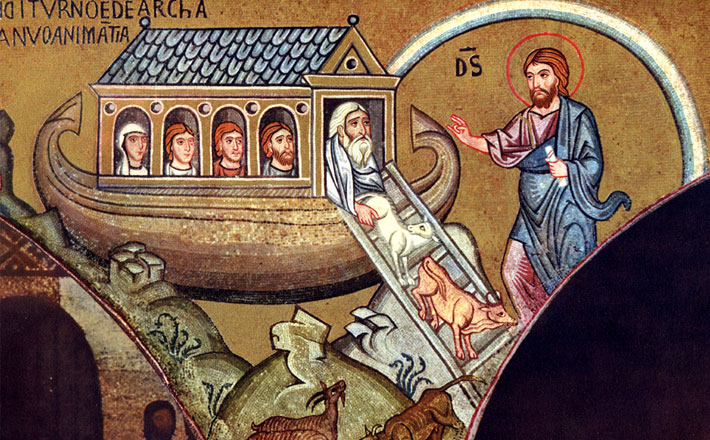Commentary on 1 Peter 3:18-22
I met a man today who is being threatened with deportation even though he has a Green Card.
Although he is a man of peace who participates in nonviolent protests, although he worked with Christian pastors in an effort to free the hostages held by Iran during the Carter era, although he has a prison ministry in the U.S., although he has converted to Christianity and would be hanged as an apostate if he were deported to Iran, Homeland Security has repeatedly accused him of plotting a suicide bombing. No evidence has ever been found to support the accusation. Nevertheless, for years he has suffered apparently random, prolonged interrogations by the authorities.
He reminds me of the people to whom 1 Peter was written. They, too, were being slandered and threatened. They had committed no crime, but their witness to Christ’s love and their determination to dedicate themselves to Christ’s service made them the constant targets of those who served the empire and hailed Caesar as Lord. Despite their innocence, they lived in fear of the authorities who controlled their world.
To this suffering community the author of 1 Peter writes, “Christ himself suffered because of evil acts, a just person suffering for unjust people, in order to bring you to God. The writer reminds Christians that though Christ was executed, and though in human terms it looked as if his story was over, God raised him to new life in the Holy Spirit. 1 Peter 3:18 is not saying that Christ’s body died but his soul was resurrected; it is saying that although from a human point of view he was put to death, he was given life in and by the power of God’s Holy Spirit, in the realm where death has no dominion. Though it may appear that the religious and civil authorities won, the real victory belongs to God.
In the Spirit, Christ continued his triumphant journey, making a proclamation to the spirits who disobeyed God before the flood. It is likely that 1 Peter is alluding here to an interpretation of Genesis 6:1-4 developed by Enoch and other apocryphal authors. These writers taught that the sons of God who intermarried with human women provoked humans to rebel against God and to attack each other. The violence unleashed by these evil powers prompted God to flood the world and imprison the rebellious angels. In 1 Peter, these disobedient angels are the imprisoned powers to whom Christ makes a proclamation. Does Christ proclaim judgment, or an opportunity to repent? The author does not say, turning instead to God’s concern for human beings.
Though the flood waters rose and overwhelmed the world, God rescued a faithful few in the ark. Just so, says 1 Peter, though violence threatens to overwhelm God’s people once more, God rescues the faithful through baptism. Baptism involves not a mere physical washing, but a pledge to maintain a clear conscience. Evidence from the early second century CE indicates that in the ancient Church eperotema (the word in v. 21 that NRSV translates as “appeal”) was the term for the pledge that baptismal candidates made to resist Satan and the evil forces that rebel against God. It is not that Christians are able, by their own strength, to escape from sin. No, it is Christ’s resurrection that frees Christians to serve God instead of bowing to evil. In Christ, we too are made alive.
The passage culminates with the assurance that the risen Christ now reigns at God’s right hand, and that the angels and authorities and powers have been subjected to him. As 1 Peter’s audience understood everyday life, the angels and authorities and powers were the supernatural forces that controlled the systems and structures of their world. If the Roman authorities and the local civil leaders persecuted Christians, it was because these human beings were agents of the supernatural powers. 1 Peter’s assurance that Christ reigns over every power was a word of great hope and comfort for Christians throughout the Roman world. Though it might appear that the evil powers still controlled their daily lives, the faithful could trust that evil was not ultimately in charge. Christ had already won the victory.
Although we do not live in a world dominated by Rome, we still know the feeling that our lives are subject to forces beyond our control. Many faithful Christians in the U.S. are stopped and searched simply because of their skin color or the way they are dressed, even though they have done nothing wrong. If those of us who do not experience such prejudice on a daily basis try to identify with the people in our society who live under a constant shadow of suspicion, we may end up being treated just as they are. If we protest against police brutality, we may be arrested. If we express our concern for human rights or for God’s creation by participating in non-violent protests, we may face legal consequences or find it difficult to get a job. Few among us live under the threat of death, but if we seek to live out our faith in the world, we may indeed encounter systems that oppose our witness and cause us to suffer.
For us, just as for the first-century Christians to whom the author of 1 Peter was writing, today’s passage speaks an important word. No government, corporation, or employer is ultimate. No oppressive system is greater than the power of God. If we suffer because we work for justice, if we are publicly shamed for doing what is right, we can be sure that our lives are in God’s hands, and God will have the last word. Christ walks with us in our suffering. Christ has already won the victory. Our task is to remain faithful and wait for God’s triumph to be revealed to the world.


February 22, 2015